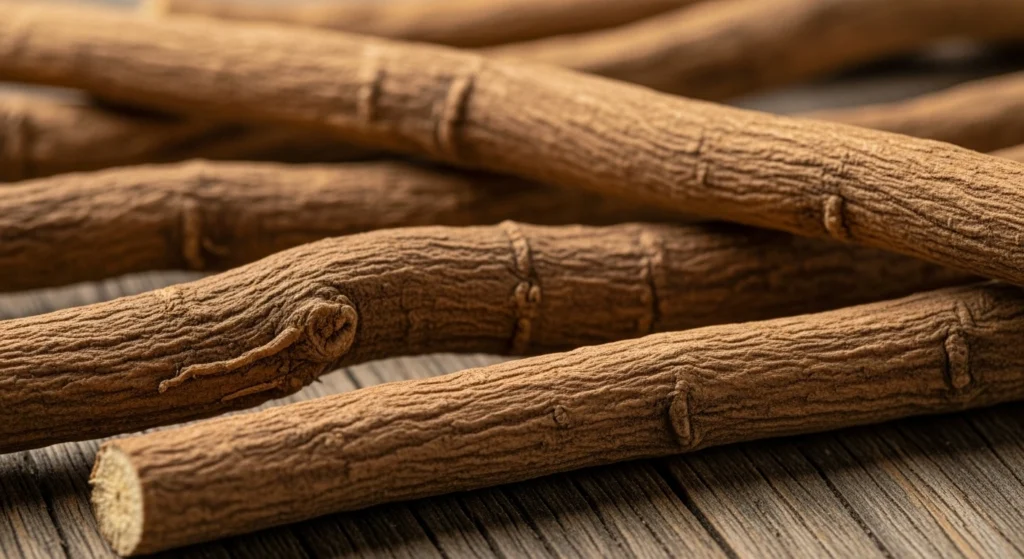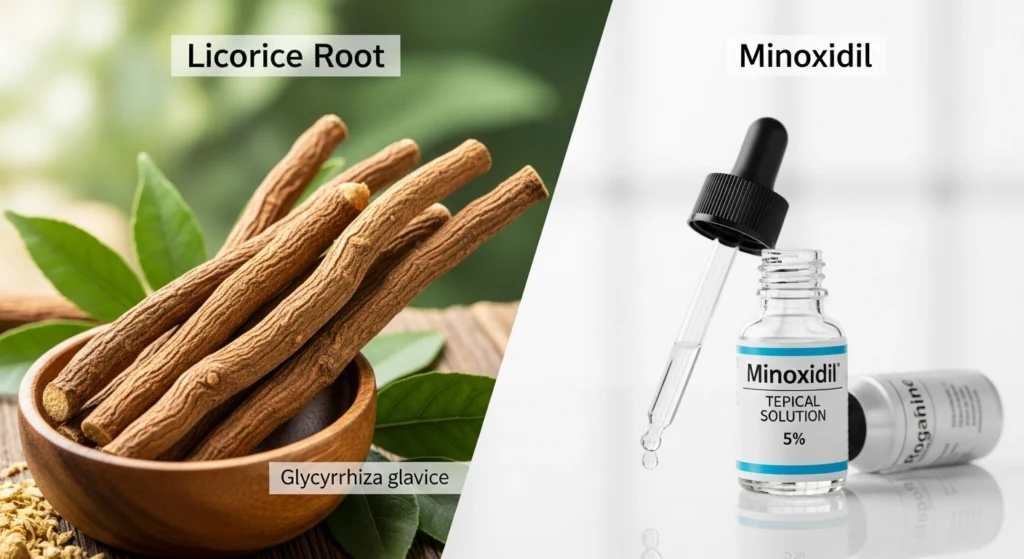Summary
Licorice root for hair loss offers a natural remedy backed by science, with its anti-inflammatory, antioxidant, and hormone-balancing properties promoting healthier hair growth. Research supports its potential in reducing hair shedding, soothing the scalp, and stimulating follicle activity.
By incorporating licorice root into your routine, you can improve scalp health and enhance hair regrowth. However, it’s essential to use it carefully and consult with a healthcare provider for the best results.
Introduction
Hair loss is a common concern affecting millions of people globally, causing stress, insecurity, and a search for effective solutions. If you’re struggling with hair thinning or scalp irritation, licorice root may offer a natural, science-backed remedy. Known for its anti-inflammatory and hormone-balancing properties, licorice root (Glycyrrhiza glabra) has been used in traditional medicine for centuries.
Recent scientific studies support its potential to stimulate hair growth, soothe the scalp, and reduce hair loss. In this article, we’ll explore how licorice root works for hair loss, review scientific findings, and provide practical guidance on how to incorporate it into your routine for healthier hair.

What Is Licorice Root and How Does It Affect Hair Health?
Licorice root is derived from the Glycyrrhiza glabra plant, known for its wide-ranging medicinal properties. Historically, it has been used in traditional medicine to treat various ailments, including respiratory issues, digestive discomfort, and skin conditions. Its benefits for hair health are now gaining more attention, with both anecdotal and scientific evidence suggesting it may play a crucial role in preventing hair loss.
Key Components of Licorice Root
Licorice root contains several bioactive compounds, including glycyrrhizin, flavonoids, and 18-β-glycyrrhetinic acid. These compounds are believed to support hair growth and health by addressing the root causes of hair loss.
- Anti-inflammatory Effects: Licorice root soothes irritated scalps, reducing inflammation and itching, both common contributors to hair loss.
- Hormonal Balance: Licorice root contains phytoestrogens, plant-based compounds that help balance hormones, which can be particularly beneficial for individuals with hormone-related hair loss.
- Scalp Stimulation: Licorice promotes blood circulation to the scalp, encouraging hair follicles to remain active and stimulate hair growth.
- Antioxidant Protection: The antioxidants in licorice root help protect hair from oxidative stress, which can weaken follicles and accelerate hair loss.
Scientific Evidence: Does Licorice Root Promote Hair Growth?
While many natural remedies for hair loss lack scientific support, licorice root has shown promise in clinical research.
Cellular Studies on Licorice Root
Studies have demonstrated that licorice root contains 18-β-glycyrrhetinic acid, which can stimulate the growth of hair follicles by promoting the proliferation of dermal papilla and outer root sheath cells. This is key in ensuring that hair enters the growth (anagen) phase and stays there for a longer period. Additionally, the compound inhibits 5α-reductase, an enzyme responsible for converting testosterone into dihydrotestosterone (DHT), a major culprit in male and female pattern baldness.
Animal Studies
In animal models, licorice extract has been shown to encourage hair regrowth. One study involving rabbits found that a topical solution containing licorice root extract was able to promote hair growth at a rate similar to that of minoxidil, a common treatment for hair loss. While animal studies are not always directly transferable to humans, this data provides a hopeful outlook for licorice’s potential.
Clinical Observations
Research has also looked into the use of glycyrrhizin, a major active compound in licorice, for treating alopecia areata, a condition characterized by sudden, patchy hair loss. Studies have found that oral glycyrrhizin may be effective in stimulating hair regrowth for individuals with mild-to-moderate alopecia areata.
How to Use Licorice Root for Hair Loss
Licorice root can be used both topically and orally to improve hair health. Here are some effective methods for incorporating it into your hair care routine.
Topical Applications
- DIY Hair Mask: Mix 1 tablespoon of licorice root powder with 2 tablespoons of yogurt or coconut oil to create a soothing hair mask. Apply this to your scalp and hair, leave it on for 30–40 minutes, then wash it out with a mild shampoo. This mask can help soothe an irritated scalp while promoting hair growth.
- Scalp Elixirs: Products like BeijaFlorNaturals’ Licorice Root Elixir combine licorice with other herbs for enhanced benefits. These elixirs can be massaged directly onto the scalp to improve circulation and reduce inflammation.
Oral Consumption
Licorice root can also be taken internally for hair health. However, it’s essential to use deglycyrrhizinated licorice (DGL), as glycyrrhizin can cause side effects, such as increased blood pressure, when consumed in large amounts.
- Licorice Tea: You can brew licorice root tea by steeping dried licorice root in hot water. Drink a cup of this tea daily for its benefits. However, avoid excessive consumption to prevent side effects.
- Supplements: Licorice root is available in supplement form, often combined with other herbs that promote hair health. Be sure to choose a product that is free from glycyrrhizin to avoid unwanted health risks.
Precautions
- Use Deglycyrrhizinated Licorice (DGL): To minimize the risk of side effects, such as high blood pressure or fluid retention, always opt for DGL products.
- Consult a Healthcare Provider: If you have underlying health conditions, such as hypertension or diabetes, or if you’re pregnant or breastfeeding, consult with a healthcare provider before using licorice root.
What the Research Shows: Licorice Root vs. Minoxidil
When comparing licorice root to minoxidil, the active ingredient in many over-the-counter hair regrowth treatments, the scientific evidence on licorice’s effectiveness is still emerging, but promising.
Licorice Root vs. Minoxidil: Hair Growth Efficacy

- Licorice Root: Animal studies have shown that licorice extract can encourage hair growth, with effects similar to those of 2% minoxidil. This suggests that licorice root could serve as an alternative or complementary treatment for hair loss.
- Minoxidil: While minoxidil is FDA-approved and widely recognized for promoting hair regrowth, it can cause side effects, such as scalp irritation. Licorice root, being a natural remedy, may be a gentler alternative, especially for those with sensitive skin.
Safety and Side Effects of Licorice Root
Licorice root can cause high blood pressure, low potassium levels, and fluid retention if taken in large quantities. To reduce these risks, it’s crucial to use deglycyrrhizinated licorice and follow the recommended dosage. Always consult your doctor if you’re on medication or have underlying health conditions.
Safety Considerations and Potential Side Effects
While licorice root offers many benefits, it’s essential to use it carefully. The main active compound, glycyrrhizin, can cause negative side effects when consumed in excess.
Glycyrrhizin Risks
- Increased Blood Pressure: Glycyrrhizin has been shown to raise blood pressure, which can be problematic for people with hypertension.
- Potassium Depletion: Prolonged use can lead to a decrease in potassium levels, resulting in muscle weakness, fatigue, and other symptoms.
- Fluid Retention: Glycyrrhizin may cause the body to retain sodium and fluids, which can lead to swelling and weight gain.
Recommendations
- Always choose deglycyrrhizinated licorice (DGL) products to avoid these side effects.
- Limit oral intake of licorice root to a moderate amount and consult with a healthcare professional before beginning treatment.
Integrating Licorice Root into Your Hair Care Routine
Dermatologists recommend introducing licorice root products gradually to monitor how your scalp responds. If you experience irritation or negative side effects, discontinue use and consult with your doctor. Many users report significant improvements in scalp health, reduced shedding, and healthier-looking hair when using licorice root consistently.
Where to Find Licorice Root Products for Hair Care
Licorice root-based hair care products are widely available, both online and in health stores. You can purchase topical elixirs, shampoos, and masks, or opt for oral supplements such as licorice root tea.
Oral Supplements: Choose deglycyrrhizinated licorice (DGL) supplements for safer consumption.
Topical Products: Look for products from trusted brands like BeijaFlorNaturals that incorporate licorice root into their hair care solutions.
Frequently Asked Questions (FAQs)
Can licorice root reverse hair loss?
How often should I use licorice root for hair health?
Is licorice root safe for everyone?
Can I use licorice root alongside other hair loss treatments?
Next step
Licorice root presents a promising natural remedy for individuals experiencing hair loss. Its anti-inflammatory, antioxidant, and hormonal-balancing properties make it an effective option for improving scalp health and stimulating hair growth. However, like any treatment, licorice root should be used with care, especially regarding dosage and potential interactions with medications.
If you’re considering adding licorice root to your hair care regimen, consult with a healthcare provider to ensure it’s the right choice for you. With proper use, licorice root can be a valuable addition to your hair growth journey.
Ready to explore the benefits of licorice root for your hair? Book a consultation with a dermatologist today to discuss how licorice root can be incorporated into your personalized hair care routine.
